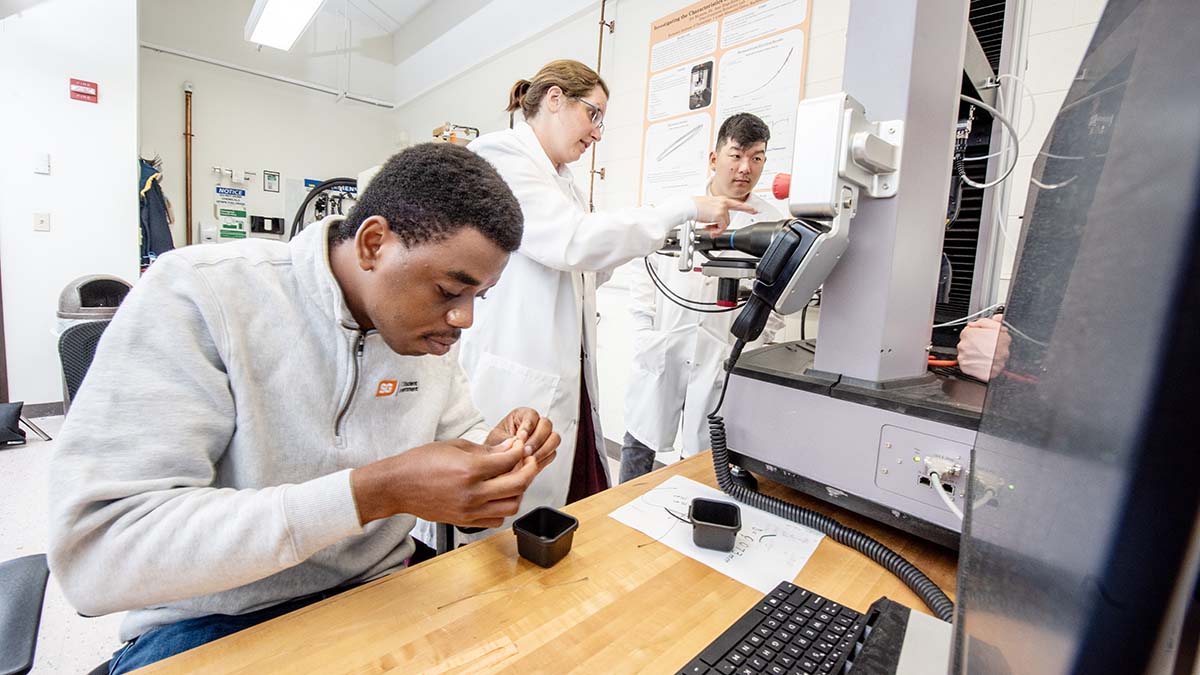Engineering vs. Engineering Technology

Engineering vs.
Engineering Technology
Engineering vs. Engineering Technology
What's the Difference?
At RIT, we offer degrees in engineering and degrees in engineering technology. While there are subtle differences in the course work between the two, choosing a major is more about identifying what you like to do and how you like to do it.
|
Engineering Majors |
Engineering Technology Majors |
|
General Characteristics |
|
| Students learn to use fundamental scientific and engineering principles to create new technologies | Students learn to use scientific and engineering principles to implement new technologies |
| Creating new technologies: Requires a strong theoretical understanding of math and science principles | Implementing new technologies: Requires a strong understanding of the application of math and science principles |
|
Math and Science |
|
| Students complete a four-course sequence in calculus and differential equations | Students complete a three-course sequence in calculus and differential equations (a four- course sequence is optional) |
| Students complete a two-course sequence in calculus-based physics | Students complete a two-course sequence in algebra and trigonometry-based physics (calculus-based physics is optional) |
| Completing the math and science requirements is essential to progress through the early technical courses | Completing the math and science requirements is essential, but progression through the early technical courses will not be hindered |
|
Course Work |
|
| Relies more heavily on calculus preparation and is more calculus-based | More algebra- and trigonometry-based and relies less heavily on calculus preparation |
| Typically provides a strong theoretical background with some application | Typically focused on application blended with some theoretical background |
| Includes fundamental principles focusing on where the equations come from, the importance of equations, the detailed derivation of the equations, and how to use the equations in solving engineering problems | Includes fundamental principles focusing on where the equations come from, the importance of equations, and how to use the equations in solving engineering problems |
Cooperative Education: Launch Your Engineering Career
6th
RIT Ranked Top School for Co-op or Internship Programs
U.S. News & World Report, 2025
100%
Participation in Co-op
All engineering and engineering technology majors participate in co-op
What sets RIT engineering and engineering technology graduates apart from their competitors isn’t just their degree. It’s what they’ve accomplished before they’ve even received it.
Cooperative education, or co-op for short, is full-time, paid work experience in an engineering field of study. These opportunities are intentional and purposeful—and designed for students to apply their engineering skills in real-world settings, interact with industry experts, explore professional work environments, and enhance their perspectives.
Select Co-op and Permanent Employers
| Apple | GE Aviation | NASA |
| Bausch & Lomb | General Motors | ON Semiconductor |
| BMW | Ortho Clinical Diagnostics | |
| The Boeing Company | Honda | SpaceX |
| Bristol-Myers Squibb | iRobot | Tesla |
| Cisco | Johnson & Johnson | Texas Instruments |
| Collins Aerospace | Lockheed Martin | Toyota |
| Cummins, Inc. | Moog | The Walt Disney Company |
Learn more about engineering co-ops and how they set you apart.
Turn Your Engineering Ideas into Reality
It is one thing to have an idea, it’s another to turn that idea into something tangible. At RIT, you’ll have unprecedented access to the resources that inspire creativity and that bring your ideas to life.
The Construct
RIT’s all-access makerspace where you have access to rapid prototyping facilities, 3D printers, laser-cutters, CNC mills, and workspaces for circuit board fabrication and assembly, metal/woodworking, and CAD, CAM, and circuit design.
Student Performance Teams
Gain experience in leadership with the SAE Baja Team, RIT Racing (SAE Formula One), Hot Wheelz: A Women-Led RIT Racing Team, Clean Snowmobile Team, Electric Vehicle Team, Robotics Club, Concrete Canoe, Launch Rocketry Club, and more.
Simone Center for Innovation and Entrepreneurship
Enhance your innovation and entrepreneurship activities via access to events, business mentoring, seed money competitions, and other resources that bring your business ideas to life.
The SHED
A 100,000-sq-ft creative hub that centralizes RIT’s makerspaces and performing arts studios and theaters–all designed to inspire innovation and collaboration.
Earn Two Degrees in Five Years with Our Combined Accelerated Bachelor's/Master's Degree
A typical RIT engineering degree is five years. Why not earn two degrees in the same amount of time?
With a Combined Accelerated Bachelor’s/Master’s Degree, you’ll maximize your college investment, optimize your earning potential, and diversify your education.
Make an Impact

Many of today’s most pressing problems–improving urban infrastructure, making solar energy economical, securing cyber-space, providing access to clean water, and developing better medicines and medical devices–require an engineering solution.
RIT’s outstanding engineering program, from our academic majors and co-op opportunities to clubs, resources, and industry partnerships, prepares you with the technical skills needed for successful engineering careers and the broad-based knowledge required to design lasting solutions.











